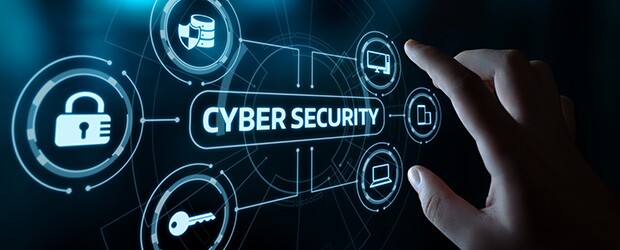Defining the importance of cybersecurity and stay safe online
The importance of cybersecurity cannot be overstated. It is not merely a matter of protecting our personal information and financial assets.

\In an increasingly interconnected world, where our lives are heavily reliant on digital technology, the importance of cybersecurity cannot be overstated.
Cybersecurity is not just a concern for businesses and organizations; it's a vital aspect of our daily lives. From personal data protection to safeguarding critical infrastructure, the implications of inadequate cybersecurity can be far-reaching and devastating.
In this blog post, we'll explore the significance of cybersecurity and provide practical tips on how to stay safe online.
Understanding the Importance of Cybersecurity
- Protection of Personal Information: One of the most critical aspects of cybersecurity is the protection of personal information. We share a plethora of data online, from social media profiles to financial information. If this information falls into the wrong hands, it can lead to identity theft, financial fraud, and other forms of exploitation.
- Preventing Financial Loss: Cyberattacks can result in significant financial losses. Hackers can steal money directly from your bank account or engage in fraudulent activities using your financial information. Businesses are also at risk of financial losses due to the theft of intellectual property or customer data.
- Safeguarding National Security: Cyberattacks can pose a serious threat to national security. State-sponsored hackers and cybercriminals can target critical infrastructure, disrupt essential services, and compromise government systems. Ensuring a strong cybersecurity posture is crucial for protecting a nation's sovereignty and stability.
- Preserving Reputations: A security breach can tarnish an individual's or an organization's reputation. Customers are less likely to trust a business that has experienced a data breach, and individuals may face social consequences if their personal information is exposed.
- Preventing Ransomware Attacks: Ransomware attacks have become increasingly prevalent. These attacks involve encrypting a victim's data and demanding a ransom for its release. Paying the ransom is not recommended, as it does not guarantee the return of data and may encourage further attacks.
How to Stay Safe Online
Now that we understand the importance of cybersecurity, let's delve into practical steps you can take to stay safe online:
1. Use Strong, Unique Passwords:
Passwords are your first line of defense. Create strong passwords that include a mix of upper and lower case letters, numbers, and special characters. Avoid using easily guessable information like birthdays or names. Consider using a reputable password manager to generate and store complex passwords securely.
2. Enable Two-Factor Authentication (2FA):
2FA adds an extra layer of security by requiring you to provide two forms of authentication before accessing an account. Typically, this involves something you know (password) and something you have (e.g., a mobile device). Enable 2FA wherever possible, especially for your email and financial accounts.
3. Keep Software Updated:
Regularly update your operating system, web browsers, and software applications. Updates often include security patches that address vulnerabilities. Cybercriminals frequently exploit outdated software to gain access to systems.
4. Be Cautious with Email:
Email is a common vector for phishing attacks. Be skeptical of unsolicited emails, especially those requesting personal information or financial details. Avoid clicking on links or downloading attachments from unknown or suspicious sources. Verify the sender's authenticity before taking any action.
5. Educate Yourself About Phishing:
Phishing attacks are designed to trick individuals into revealing sensitive information. Learn to recognize common phishing tactics, such as fake login pages and email impersonation. Be cautious when providing personal information online, even if a request seems legitimate.
6. Secure Your Wi-Fi Network:
If you have a wireless network at home, ensure it is password-protected and uses encryption (e.g., WPA3). Change the default username and password for your router to prevent unauthorized access. Avoid using public Wi-Fi networks for sensitive transactions.
7. Use Antivirus Software:
Install reputable antivirus and anti-malware software on your devices. These programs can detect and remove malicious software that could compromise your security. Keep your antivirus software updated to stay protected against the latest threats.
8. Practice Safe Social Media Usage:
Be mindful of the information you share on social media platforms. Cybercriminals can use publicly available information to craft convincing phishing emails or target you with personalized attacks. Adjust your privacy settings to limit the visibility of your personal data.
9. Back Up Your Data:
Regularly back up your important data to an external hard drive or a secure cloud storage service. In the event of a ransomware attack or data loss, having a backup ensures you can recover your information without paying a ransom.
10. Stay Informed:
Stay informed about the latest cybersecurity threats and best practices. Cybersecurity is an ever-evolving field, and new threats emerge regularly. Follow reputable cybersecurity news sources and consider taking online courses or attending workshops to improve your knowledge.
11. Protect Your Mobile Devices:
Smartphones and tablets are vulnerable to cyberattacks. Install security apps, keep your device's operating system updated, and only download apps from official app stores. Use a lock screen or biometric authentication to secure your device.
12. Be Skeptical of Online Offers:
Beware of online offers that seem too good to be true. Scammers often use enticing offers to lure victims into sharing personal or financial information. Verify the legitimacy of online deals and offers before making any purchases.
Cybersecurity is a critical aspect of modern life, affecting individuals, businesses, and even national security. By following the practical tips outlined in this blog post, you can significantly reduce your risk of falling victim to cyberattacks.
Remember that cybersecurity is an ongoing process, and staying vigilant is key to staying safe online. Protect your personal information, secure your devices, and stay informed about the latest threats to enjoy a safer online experience.
What's Your Reaction?















